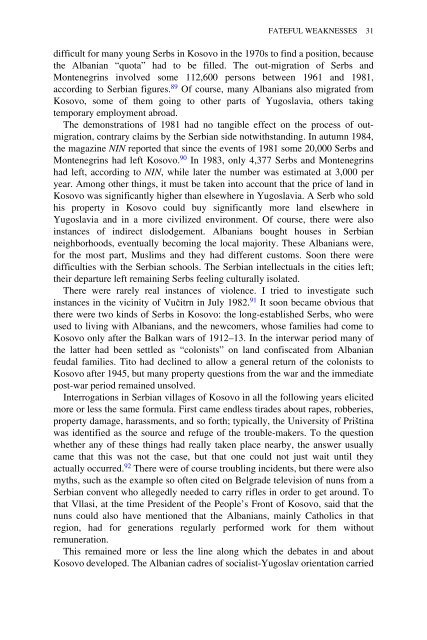Yugoslavia: A History of its Demise - Indymedia
Yugoslavia: A History of its Demise - Indymedia
Yugoslavia: A History of its Demise - Indymedia
Create successful ePaper yourself
Turn your PDF publications into a flip-book with our unique Google optimized e-Paper software.
FATEFUL WEAKNESSES 31<br />
difficult for many young Serbs in Kosovo in the 1970s to find a position, because<br />
the Albanian “quota” had to be filled. The out-migration <strong>of</strong> Serbs and<br />
Montenegrins involved some 112,600 persons between 1961 and 1981,<br />
according to Serbian figures. 89 Of course, many Albanians also migrated from<br />
Kosovo, some <strong>of</strong> them going to other parts <strong>of</strong> <strong>Yugoslavia</strong>, others taking<br />
temporary employment abroad.<br />
The demonstrations <strong>of</strong> 1981 had no tangible effect on the process <strong>of</strong> outmigration,<br />
contrary claims by the Serbian side notwithstanding. In autumn 1984,<br />
the magazine NIN reported that since the events <strong>of</strong> 1981 some 20,000 Serbs and<br />
Montenegrins had left Kosovo. 90 In 1983, only 4,377 Serbs and Montenegrins<br />
had left, according to NIN, while later the number was estimated at 3,000 per<br />
year. Among other things, it must be taken into account that the price <strong>of</strong> land in<br />
Kosovo was significantly higher than elsewhere in <strong>Yugoslavia</strong>. A Serb who sold<br />
his property in Kosovo could buy significantly more land elsewhere in<br />
<strong>Yugoslavia</strong> and in a more civilized environment. Of course, there were also<br />
instances <strong>of</strong> indirect dislodgement. Albanians bought houses in Serbian<br />
neighborhoods, eventually becoming the local majority. These Albanians were,<br />
for the most part, Muslims and they had different customs. Soon there were<br />
difficulties with the Serbian schools. The Serbian intellectuals in the cities left;<br />
their departure left remaining Serbs feeling culturally isolated.<br />
There were rarely real instances <strong>of</strong> violence. I tried to investigate such<br />
instances in the vicinity <strong>of</strong> Vučitrn in July 1982. 91 It soon became obvious that<br />
there were two kinds <strong>of</strong> Serbs in Kosovo: the long-established Serbs, who were<br />
used to living with Albanians, and the newcomers, whose families had come to<br />
Kosovo only after the Balkan wars <strong>of</strong> 1912–13. In the interwar period many <strong>of</strong><br />
the latter had been settled as “colonists” on land confiscated from Albanian<br />
feudal families. Tito had declined to allow a general return <strong>of</strong> the colonists to<br />
Kosovo after 1945, but many property questions from the war and the immediate<br />
post-war period remained unsolved.<br />
Interrogations in Serbian villages <strong>of</strong> Kosovo in all the following years elicited<br />
more or less the same formula. First came endless tirades about rapes, robberies,<br />
property damage, harassments, and so forth; typically, the University <strong>of</strong> Priština<br />
was identified as the source and refuge <strong>of</strong> the trouble-makers. To the question<br />
whether any <strong>of</strong> these things had really taken place nearby, the answer usually<br />
came that this was not the case, but that one could not just wait until they<br />
actually occurred. 92 There were <strong>of</strong> course troubling incidents, but there were also<br />
myths, such as the example so <strong>of</strong>ten cited on Belgrade television <strong>of</strong> nuns from a<br />
Serbian convent who allegedly needed to carry rifles in order to get around. To<br />
that Vllasi, at the time President <strong>of</strong> the People’s Front <strong>of</strong> Kosovo, said that the<br />
nuns could also have mentioned that the Albanians, mainly Catholics in that<br />
region, had for generations regularly performed work for them without<br />
remuneration.<br />
This remained more or less the line along which the debates in and about<br />
Kosovo developed. The Albanian cadres <strong>of</strong> socialist-Yugoslav orientation carried
















